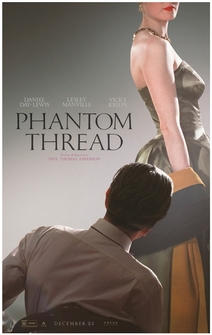Paul Thomas Anderson crafts a romantic fable where the vital desire of a woman dismantles a hierarchical world of power held by men that seemed unchangeable.
Yes, Phantom Thread is a very great feminist film. It is also a great film of gentle affirmation.
Before leaving the world of cinema, Daniel Day-Lewis, for this role, was nominated for the seventh time for the Oscar for Best Actor. If he wins, this great actor will make his exit with grandeur.
In 1950s London, the great couturier Reynolds Woodcock (Daniel Day-Lewis) reigns as an inspired tyrant over his house. Around him, the ballet of employees, mistresses, and high-class, even crowned, clients trace the arabesques of seduction and power. All these women perfectly play the extras in the parade of creation and conventions.
There, under the regency of a sister with divine rights (Lesley Manville), everything is order, luxury, and cruelty, rituals, and the respect of a relentless social and aesthetic grid, of which the genius of the creator is one of the recognized pillars.
One late night, Woodcock drives his luxury car alone to his country house. At dawn, he stops at an inn on the side of the road to have breakfast. Alma, inexperienced and full of good will, serves him.
Since the inception of cinema, only a few sequences have been able to sensitively depict what a love at first sight means. The encounter between Alma and Reynolds now joins that list.
Alma is not particularly beautiful and knows nothing of Woodcock’s world.
The way the young woman—portrayed by the almost unknown yet brilliant Vicky Krieps—subverts the patriarchal order of the Woodcock household by more than holding her own against Day-Lewis is truly admirable.
Alma, who is not anyone’s flagbearer, nor does she become an intriguer or a perverse figure, even less so a being naturally destined for chaos and destruction, is a young woman who wants to live and invents the possibilities for doing so.
But that is not at all the engine of the film. This film, the story of a mad love, is a deeply intimate story.
The “force” of this film is what physicists might call a “weak force.” It proves to be immense.


